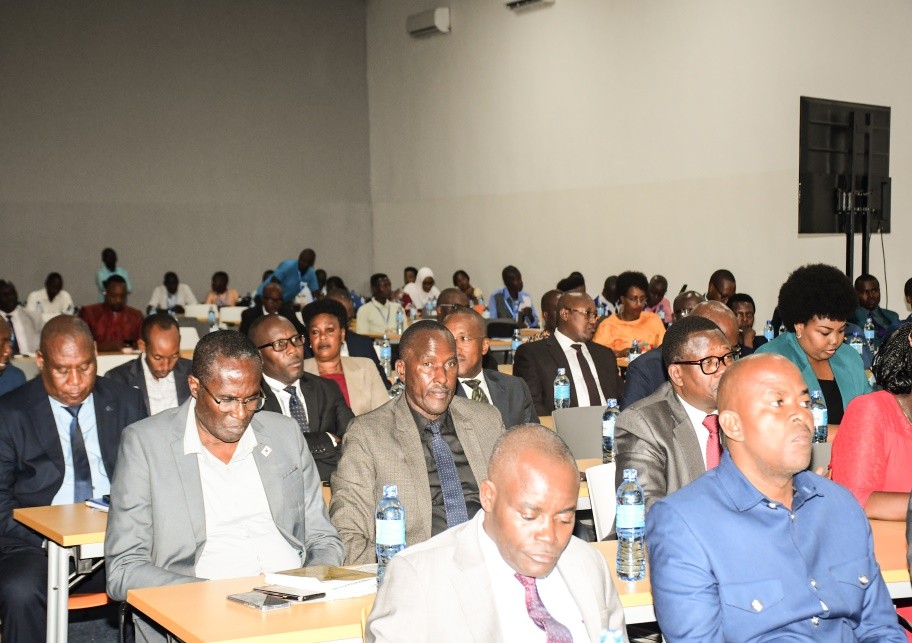BUJUMBURA, January 31st (ABP) – On Tuesday 28 January 2025, the Senate of the Republic of Burundi organised a public conference in Bujumbura, focusing on the presentation of research findings on the German colonial period and the effects of the 1925 administrative reform in Burundi, with a view to enlightening both public and international opinion on the misfortunes suffered by Burundi during that colonial period.
In his opening remarks, the President of the Burundian Senate, Emmanuel Sinzohagera, recalled that the Constitution of the Republic gives the Senate a special mission to reconcile the people of Burundi, pointing out that that mission could not be accomplished if the country’s past was ignored.
To that end, he pointed out that since 2015, the Senate has always worked on that subject in collaboration with experts in order to fully understand the effects of German colonisation and the Belgian King’s law on administrative reform in Burundi, in order to see together what can be done to calm the minds of many Burundians and to build a Burundi without conflict for the benefit of present and future generations.
He also pointed out that before the arrival of the colonisers in Burundi, the country was respectful and stable. Before the Germans penetrated Burundi,’ he said, ’the country was flourishing, a land of milk and honey, a country that was well organised administratively, economically and socially, as demonstrated by the organisation of work and festivals. Festivities were organised in peace and total security, in that case the sowing festival (Umuganuro), which testified to the freedom of the Barundi people, their mutual support and their work together,’ he explained.
Sinzohagera pointed out that the Barundi were constantly characterised by unity, illustrated by the common work known as ‘Ikibiri’, a work system that enabled them to accomplish a huge task in a short space of time because, he said, they understood that there is strength in unity.
As well as working in the fields, he continued, the Barundi practised a number of trades, including blacksmithing, basket-making, fishing, clothes-making, livestock rearing and many others, which enabled them to meet all their needs without any foreign intervention.
In particular, they were able to manufacture medicines for their own treatment and that of their livestock. ‘All sectors of the country were well organised,’ he pointed out, revealing that before colonisation, Burundi was an emerging country that put God first, while the Barundi were characterised by obedience to the king and defence of the country’s interests, as stipulated in the motto of the monarchic era: “Imana-Umwami-Uburundi” (God-King-Burundi).
The President of the Senate nevertheless deplored the fact that the trend changed with the arrival of the colonisers, whose administration was characterised by divisionism, the destabilisation of peace and communities, the plundering of the country’s treasures, as well as discrimination that led to ethnic conflicts that still persist.
To enlighten the public and the international community on the effects of colonisation in Burundi, five presentations were made. Those presentations covered historical, anthropological, socio-political, socio-economic and legal aspects. According to economist Léonidas Ndayizeye, a professor at the University of Burundi, the only thing the colonisers were able to create in Burundi was poverty, because, he explained, even if they built the first schools and brought certain cash crops to Burundi, it was for their own benefit.
Alongside those presentations, discussions were held to enrich them.
Recommendations were also made to the government of Burundi, Germany, Belgium, the Catholic Church Mission, the United States and the League of Nations. One of those recommendations was to negotiate support for industrialisation in Burundi from the former colonial powers, as reparation for the wrongs and damage caused to the Burundian people.
The President of the Senate warmly welcomed the speeches by the Belgian and German ambassadors to Burundi, who expressed their respective countries’ willingness to make a contribution to ensuring that all the issues raised by the colonial administration are cleared up, so that all those countries have a common understanding of their historical past.

That public conference was attended by : the former President of the Republic of Burundi, Sylvestre Ntibantunganya; the Deputy Secretary General of the CNDD-FDD party, the Honourable Cyriaque Nshimirimana; Members of Parliament and Senators, members of the Independent National Commission for Human Rights (CNIDH); members of the Truth and Reconciliation Commission (CVR) and the Independent National Electoral Commission (CENI); senior government officials; representatives of the judiciary and the defence and security forces; representatives of religious denominations and civil society; representatives of political parties, the diplomatic and consular corps, the United Nations system and foreign NGOs, to name but a few.

